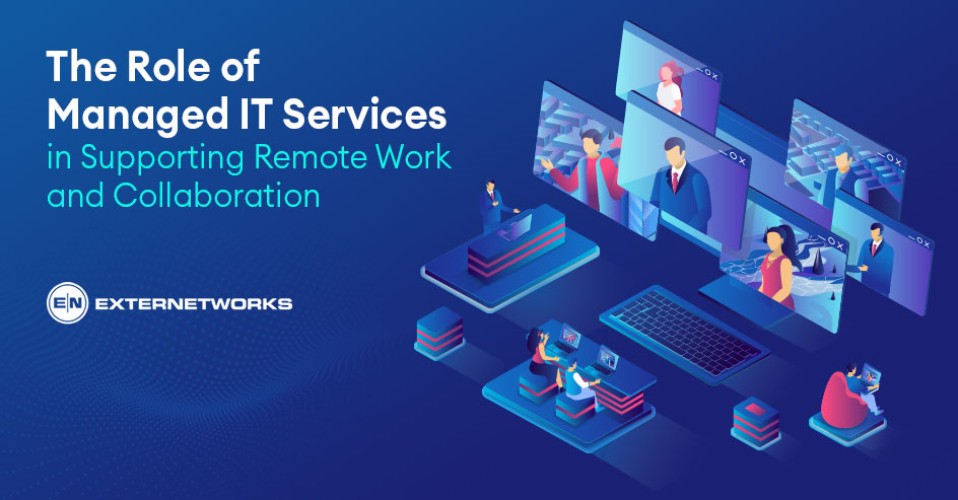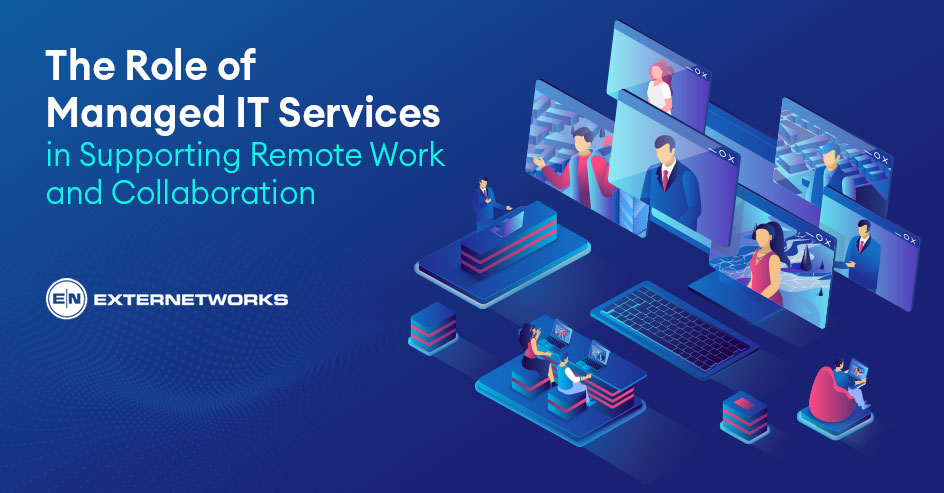
Can Managed IT Services Support Remote Work?
In today's constantly evolving work environment, the ability to work remotely has become more important than ever. But here's the question: Can Managed IT Services support remote work? Well, you're in luck because that's exactly what we're going to dive into in this article!
Picture this: You're in your pajamas, cozied up in your favorite spot at home, sipping hot cocoa while getting work done. Sounds like a dream, right? Well, with the right IT support, it can be a reality! Managed IT Services offer a range of solutions to ensure that businesses can smoothly transition to remote work setups.
Think about it - without the necessary technical assistance, working remotely can be a real headache. From securing data and networks to troubleshooting IT issues, Managed IT Services have got your back! So, let's explore how these services can transform the way we work from anywhere in the world.
Get ready to embark on a journey where technology meets productivity, as we uncover how Managed IT Services can support remote work like never before. So, grab your favorite snack and get comfortable because we're about to take remote work to a whole new level!

Can Managed IT Services Support Remote Work? Enhancing Productivity and Efficiency
In the era of digital transformation and the growing need for flexibility in the workplace, remote work has become increasingly popular. With the rise of remote work, businesses are faced with the challenge of providing their employees with the necessary tools and support to work effectively from anywhere. This is where managed IT services come into play. In this article, we will explore how managed IT services can support remote work, enhancing productivity and efficiency for both employees and organizations.
1. Seamless Connectivity and Network Infrastructure
One of the key components of successful remote work is having a reliable and secure network infrastructure. Managed IT services can ensure seamless connectivity by setting up and maintaining robust networks that enable employees to access company resources and communicate with their colleagues effortlessly, regardless of their location. With the help of managed IT services, organizations can implement virtual private networks (VPNs), firewalls, and other security measures that protect sensitive data and ensure privacy. Additionally, managed IT services can monitor the network round-the-clock, identifying and resolving any issues that may arise, thereby minimizing downtime and keeping employees connected at all times.
Moreover, managed IT services can optimize network performance by analyzing data usage patterns and implementing bandwidth management strategies. This allows organizations to ensure that employees have access to the necessary resources and applications without experiencing slow or unreliable connections, enabling them to work efficiently and effectively from anywhere.
2. Comprehensive Technical Support and Troubleshooting
Remote work comes with its fair share of IT challenges, such as software glitches, hardware malfunctions, or connectivity issues. In such situations, employees need prompt technical support to resolve these issues and resume their work without interruptions. Managed IT services provide comprehensive technical support, offering help desk services that are available 24/7. Regardless of the time zone or the nature of the technical difficulty faced by employees, the managed IT service provider can provide instant assistance, ensuring that employees can get back to work quickly.
Managed IT services can also proactively monitor the health of employees' devices, such as laptops and smartphones, remotely. This enables them to identify potential issues before they cause disruptions to work. Furthermore, managed IT services can automate software updates and patches, ensuring that employees have the latest versions of applications and security fixes installed on their devices. By handling technical support and troubleshooting, managed IT services alleviate the burden on employees, allowing them to focus on their core responsibilities and maximizing their productivity.
3. Robust Data Protection and Disaster Recovery
Remote work raises concerns about data security and protection. Managed IT services can provide robust data protection measures to ensure that sensitive information remains secure, regardless of the location from which employees are working. They can implement strong encryption protocols, multi-factor authentication, and data backup systems, allowing organizations to safeguard their data against cyber threats and accidental loss.
In addition to data protection, managed IT services also offer disaster recovery solutions. In the event of a natural disaster, system failure, or other unforeseen circumstances, remote workers need a plan in place to recover their data and resume their work with minimal disruption. Managed IT services can create backup strategies, develop disaster recovery plans, and regularly test them to ensure their effectiveness. This ensures that remote workers can quickly recover their data and continue their work seamlessly, even in the face of unexpected challenges.
4. Cost-Effective IT Infrastructure
Implementing and maintaining IT infrastructure can incur significant costs for businesses, especially when it comes to remote work setups. Managed IT services offer a cost-effective solution by eliminating the need for organizations to invest in hardware, software, and the staffing required for managing the IT infrastructure. Instead, organizations can outsource their IT needs to a managed service provider and pay a fixed monthly fee. This helps businesses save money and allocate their resources more strategically.
Furthermore, managed IT services provide scalable solutions that can adapt to the changing needs of remote workforces. As businesses grow or downsize, managed service providers can easily adjust the resources and support accordingly, ensuring that organizations are not burdened with unnecessary expenses or under-provisioned IT infrastructure.
5. Training and Skill Development
An often overlooked aspect of remote work is the need for employees to adapt to new tools, software, and work processes. Managed IT services can provide training and skill development programs to equip employees with the necessary knowledge and expertise to excel in a remote work environment. This includes training on collaboration tools, cybersecurity best practices, and time management techniques specific to remote work.
By investing in employee training, organizations can ensure that their remote workforce remains efficient, productive, and up to date with the latest technologies. This not only benefits individual employees but also contributes to the overall success of the organization.
Key Takeaways: Can Managed IT Services Support Remote Work?
- Managed IT services can provide remote workers with technical support and assistance.
- These services can ensure the security of remote work environments through effective cybersecurity measures.
- Managed IT services offer proactive monitoring and maintenance to keep remote systems running smoothly.
- They can help with setting up and managing remote access to company resources.
- Managed IT services can streamline communication channels and collaboration tools for remote teams.
Frequently Asked Questions
As remote work becomes increasingly common, many businesses are turning to managed IT services to support their operations. Here are some frequently asked questions about how managed IT services can support remote work:
1. How can managed IT services help businesses transition to remote work?
Managed IT services provide businesses with the necessary infrastructure and support to seamlessly transition to remote work. They can set up secure remote access to company networks, ensuring that employees can access important files and applications from anywhere. Additionally, managed IT services can implement and manage collaboration tools, such as video conferencing and project management software, to facilitate seamless communication and collaboration among remote teams.
Furthermore, managed IT services can monitor and manage the performance and security of remote work systems, ensuring that all devices, networks, and applications are properly maintained and protected. With their expertise, businesses can confidently transition to remote work without compromising productivity or security.
2. Can managed IT services help with securing remote work environments?
Absolutely! One of the key benefits of managed IT services is their ability to enhance security measures for remote work environments. Managed IT service providers can implement strong security protocols, such as multi-factor authentication and encryption, to protect remote connections and data. They can also conduct regular security audits and vulnerability assessments to identify and address any potential risks or weaknesses.
Furthermore, managed IT services can provide ongoing cybersecurity training and education to employees, ensuring that they are aware of best practices for secure remote work. By proactively managing security measures and educating employees, managed IT services play a crucial role in safeguarding remote work environments from cyber threats.
3. How can managed IT services ensure the reliability of remote work systems?
Managed IT services have the expertise and resources to ensure the reliability of remote work systems. They can proactively monitor and manage network infrastructure, servers, and devices to identify and resolve issues before they impact productivity. This includes monitoring network performance, addressing software and hardware updates, and implementing backup and disaster recovery plans.
With managed IT services, businesses can rely on a dedicated team to handle any technical issues or disruptions that may arise. This allows employees to focus on their work without worrying about the reliability of their remote work systems, ensuring consistent productivity and minimal downtime.
4. Can managed IT services assist with remote technical support?
Absolutely! Managed IT services provide remote technical support to address any IT issues or challenges that remote employees may face. They offer help desk support, allowing employees to quickly get assistance for any technical difficulties they encounter. Whether it's troubleshooting software problems, resolving network issues, or setting up new devices, managed IT services are there to provide reliable support remotely.
This remote technical support minimizes downtime and frustration for employees, ensuring that they can continue their work smoothly. Whether it's during business hours or outside regular working hours, managed IT services are available to provide prompt assistance and keep remote work environments running smoothly.
5. Can managed IT services help businesses adapt to evolving remote work needs?
Absolutely! Managed IT services are equipped to help businesses adapt to evolving remote work needs. They stay up to date with the latest technologies and trends, providing businesses with recommendations and solutions to enhance remote work capabilities. Whether it's implementing new collaboration tools, optimizing network infrastructure, or ensuring compliance with remote work regulations, managed IT services can assist businesses in staying agile and adaptable.
Furthermore, managed IT services offer scalability, allowing businesses to easily adjust their IT resources and support as their remote work needs grow or change. With their expertise and flexibility, managed IT services are invaluable partners in supporting businesses through the dynamic landscape of remote work.
What to expect when working remotely with an MSP
Summary:
So, can managed IT services support remote work? The answer is a resounding yes! Managed IT services provide the necessary support, security, and technical expertise that remote workers need to thrive in today's digital world. With managed IT services, employees can access their work files and systems from anywhere, ensuring productivity and collaboration. These services also offer proactive monitoring and maintenance to keep computer systems running smoothly and prevent downtime. Plus, with enhanced cybersecurity measures, remote workers can feel confident that their data is protected. So, whether you're a student or a professional, managed IT services can make remote work easier and more efficient.
In conclusion, managed IT services are a valuable resource for remote workers, offering the essential tools and support needed for success. The ability to access work files and systems remotely, along with proactive monitoring and maintenance, ensures productivity and prevents downtime. With enhanced cybersecurity measures, remote workers can work confidently, knowing that their data is protected. So, if you're considering remote work, don't forget to take advantage of managed IT services to make your life easier!
Recent Posts
- How Does GPON Improve Network Efficiency?
- What Are The Advantages Of GPON?
- What Are The Benefits Of IT Outsourcing?
- What's The Deal With Ransomware Attacks?
- Are GPON Providers Widely Available?
- What's GPON's Impact On Bandwidth?
- Why Is Multi-Factor Authentication Important?
- How To Ensure Data Privacy Compliance?
 Blogs
Blogs Infographics
Infographics Videos
Videos Podcasts
Podcasts Case Studies
Case Studies Call For Quote
Call For Quote